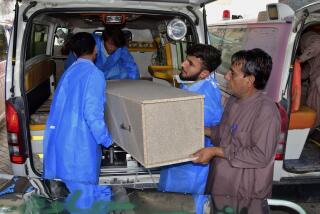Militants execute 15 Pakistani troops
Islamist militants on Thursday claimed responsibility for killing 15 Pakistani paramilitary troops this week, dealing a serious setback to the prospect of peace talks between Islamabad and the country’s homegrown insurgency.
The bodies of the men, abducted in December from a fort near the Afghan border, were found in the village of Shewa in North Waziristan, a tribal region that serves as a stronghold for several Pakistani and Afghan insurgent groups, local officials said. The victims were members of the Frontier Constabulary, which patrols the volatile tribal districts along the border.
Twenty-two paramilitary members were seized by gunmen Dec. 22; one other was killed at the time, and seven later escaped.
The Pakistani Taliban said the executions this week were in retaliation for a military operation in the Khyber tribal region Jan. 1 in which 12 Taliban militants died. Among them was Qari Kamran, a commander who headed the insurgent group’s operations in the northwestern city of Nowshera.
The Taliban said Pakistani soldiers also detained women and children, members of militants’ families, in Khyber. “Both sharia [Islamic law] and local traditions do not permit the killing of mujahedin fighters and the arrests of women and children,” the Taliban said in a statement released in North Waziristan.
Also Thursday, the International Committee of the Red Cross said one of its workers, a British national, was kidnapped in the southwestern city of Quetta. Khalil Rasjed Dale, a health program manager, was on his way home from work in a Red Cross-marked vehicle when gunmen seized him, the organization said. It said no group had claimed responsibility.
The deaths of the paramilitary troops will probably complicate government efforts to reach a negotiated solution to years-long conflict with the Pakistani Taliban, which opposes Islamabad’s alliance with the U.S. and has been responsible for the deaths of more than 4,000 people in suicide bombings and other attacks.
Al Qaeda has been trying to persuade the Pakistani Taliban to turn its focus from Pakistani security forces and civilians and band together with Afghan Taliban militants battling U.S. troops in Afghanistan, according to Pakistani news reports.
Though there is no confirmation that talks between the government and Pakistani Taliban militants are imminent, Pakistani leaders have expressed a strong interest in tackling the problem of militancy through peace negotiations rather than military confrontation. Prime Minister Yousuf Raza Gilani has said Islamabad is ready to talk with insurgents who agree to lay down arms. Elements within the Pakistani Taliban have signaled their willingness to negotiate.
However, experts remain doubtful that a settlement could be reached, largely because previous peace agreements have collapsed, ultimately allowing insurgents to regroup and commandeer more territory. Though the army has used several large-scale operations to wrest control of territory from the Pakistani Taliban, the group still maintains strongholds throughout the tribal belt.
The Pakistani Taliban has also become increasingly splintered, making it more difficult for the government to determine with whom to negotiate.
Rodriguez reported from Islamabad and special correspondent Ali reported from Peshawar.
More to Read
Start your day right
Sign up for Essential California for news, features and recommendations from the L.A. Times and beyond in your inbox six days a week.
You may occasionally receive promotional content from the Los Angeles Times.






